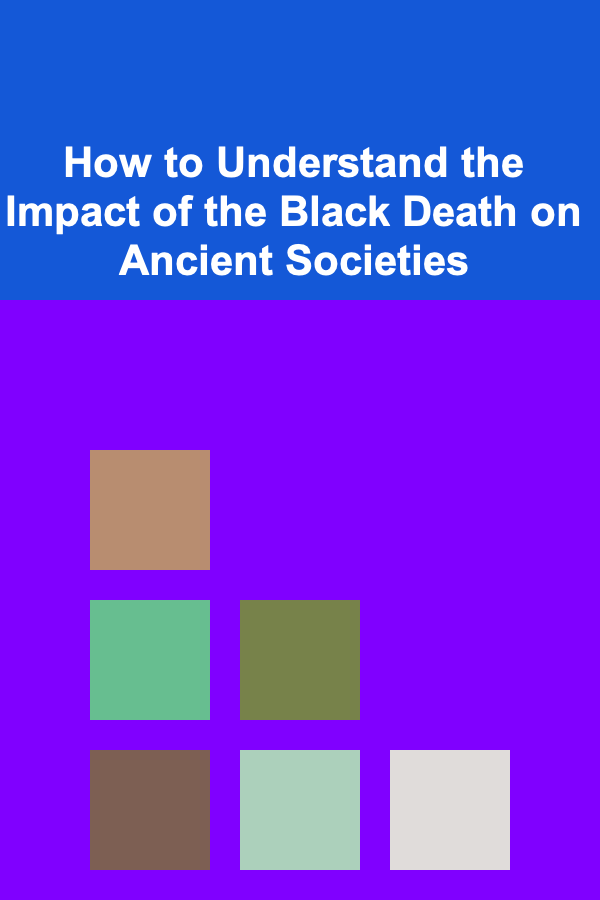
How to Understand the Impact of the Black Death on Ancient Societies
ebook include PDF & Audio bundle (Micro Guide)
$12.99$9.99
Limited Time Offer! Order within the next:

The Black Death, one of the most devastating pandemics in human history, swept across Europe, Asia, and North Africa in the 14th century, leaving an indelible mark on ancient societies. Its far-reaching effects transcended the immediate death toll, influencing economic systems, social structures, religious practices, and even cultural attitudes. Understanding the impact of the Black Death requires not only exploring its immediate consequences but also considering the long-term shifts it caused across multiple domains of ancient societies. In this article, we delve into the multi-faceted impacts of the Black Death and its transformative role in reshaping the ancient world.
The Origins and Spread of the Black Death
The Black Death is believed to have originated in the steppes of Central Asia, with the disease likely carried by fleas that infested rodents, particularly the black rat. These fleas transmitted the bacterium Yersinia pestis, the causative agent of the plague. The pandemic spread along trade routes, reaching the Crimea in 1347 before expanding rapidly across Europe, Asia, and the Middle East. Its rapid spread was facilitated by the extensive trading networks of the medieval world, allowing the disease to spread from port cities to inland regions.
The epidemic was marked by symptoms such as fever, chills, swelling of lymph nodes (buboes), and blackening of the skin, leading to the name "Black Death." In some areas, the mortality rate was staggeringly high, with entire communities wiped out within days or weeks. The Black Death ultimately killed an estimated 75 million to 200 million people, representing up to 60% of Europe's population at the time. The extent of this loss would have profound and far-reaching effects on the fabric of ancient societies.
The Demographic Impact
The most immediate and tragic consequence of the Black Death was the massive loss of life. Entire villages, towns, and cities were decimated, leaving a huge demographic vacuum. This demographic catastrophe led to the decline of the feudal system in Europe, as there were simply not enough people to maintain the same labor force that had been essential to medieval agricultural society.
With a significant portion of the population dead, labor shortages ensued, especially in rural areas. This shift forced societies to adapt to a new social reality, where the remaining population could demand higher wages, better living conditions, and more autonomy. In some cases, peasants and workers who had once been tied to the land and beholden to their lords began to assert more control over their lives. In this way, the Black Death indirectly contributed to the breakdown of the feudal system and laid the groundwork for the rise of more modern economic systems, such as early capitalism.
The labor shortages also had economic consequences. As skilled artisans, farmers, and other workers died, economic production dropped significantly. This led to a reduction in agricultural output, trade, and industrial production. In the long term, the absence of a significant portion of the population meant that there was less demand for goods and services, which led to economic stagnation. However, this period of economic hardship also saw the emergence of new agricultural techniques and innovations, particularly in the form of land reclamation and crop diversification, as the remaining population sought to adapt to the changing landscape.
Social and Cultural Shifts
The Black Death didn't just change the physical makeup of societies; it also altered their social and cultural fabric. The immense loss of life caused by the plague gave rise to widespread fear, anxiety, and a sense of nihilism, which had a profound impact on cultural and artistic expressions. In medieval Europe, the plague led to an increased focus on death and the afterlife, which can be seen in the prominence of the "Danse Macabre" (Dance of Death) motif in art and literature. This cultural shift reflected a growing preoccupation with mortality and the fragility of life.
In addition, the Black Death contributed to a reevaluation of the role of religion in society. In many cases, people turned to religious authorities for comfort and explanation, with some believing that the plague was a punishment from God. Others, however, began to question the authority of the Church, as it was unable to prevent the devastation or provide effective solutions. This skepticism contributed to growing discontent with the Catholic Church, which would later play a role in the Protestant Reformation. The plague also gave rise to new religious movements and mysticism, as people sought alternative explanations for the crisis and looked for ways to protect themselves from further suffering.
In some regions, the Black Death also led to the persecution of minorities, particularly Jews, who were scapegoated for the plague's spread. Widespread anti-Semitic sentiment led to violent pogroms, where Jewish communities were blamed for causing the pandemic and were often massacred or forced into exile. These social fractures further highlighted the tensions between different social and religious groups, contributing to a legacy of ethnic and religious division that would persist for centuries.
Economic Transformation
The Black Death had profound and lasting economic consequences that reshaped the structure of medieval economies. As mentioned earlier, the loss of a significant portion of the population led to a shortage of labor, particularly in agriculture and industry. The economic structures that had previously relied on a large, inexpensive workforce were forced to adapt to the new realities of a smaller, more expensive labor pool.
In many regions, the sudden scarcity of workers led to higher wages, particularly in rural areas, where agricultural labor was most needed. This shift in the balance of power between workers and landowners marked the beginning of the end for feudalism. As labor became more valuable, peasants and workers found themselves with more bargaining power, leading to a gradual erosion of the traditional social hierarchy.
In addition to changes in labor relations, the Black Death also impacted trade. With a reduced population, there was less demand for goods and services, which led to a slowdown in trade and economic activity. However, in the long term, the disruption of traditional markets created opportunities for the growth of new economic systems, such as merchant capitalism and the early development of banking and financial markets.
Some historians argue that the Black Death acted as a catalyst for the transition from a medieval economy to a more modern, market-driven economy. The growing importance of trade and commerce, coupled with the rise of a wealthier merchant class, played a significant role in the later economic transformations of the Renaissance and early modern period.
Political and Institutional Changes
The Black Death also had significant political and institutional ramifications. The sudden loss of so many lives left a leadership vacuum in many regions, as local rulers, nobles, and clergy were also affected by the disease. In some cases, the political instability caused by the pandemic led to social unrest and rebellion, as people sought to assert their rights and challenge the old order.
In Europe, the weakening of the feudal system and the rise of new forms of political and economic organization paved the way for the development of more centralized states. Monarchs, seeking to stabilize their realms, consolidated power and imposed more direct control over their territories. In some regions, this period of instability gave rise to more authoritarian forms of government, as rulers sought to maintain order in the face of widespread uncertainty.
The aftermath of the Black Death also saw the strengthening of the early modern state apparatus, including the development of more sophisticated systems of taxation and military organization. In many cases, rulers began to rely more heavily on professional armies and standing bureaucracies to maintain control, marking a shift away from the feudal military system.
Long-term Cultural and Philosophical Consequences
The Black Death's impact on ancient societies was not confined to the immediate social and economic consequences. The plague also prompted a shift in philosophical and cultural attitudes toward life, death, and the human condition. In the aftermath of the Black Death, there was a significant shift in the way people viewed the world and their place within it. The staggering loss of life led many to question the meaning of existence and the role of religion in shaping their lives.
One of the most significant philosophical shifts that arose in the wake of the Black Death was the rise of humanism, particularly in Renaissance Italy. Humanists emphasized the importance of individual experience and the value of human achievement, as opposed to the medieval focus on divine will and the afterlife. This shift in perspective helped lay the intellectual foundations for the Renaissance, a period of renewed interest in classical learning and a celebration of human potential.
The Black Death also played a role in the development of early modern scientific thought. The inability of medieval medicine and religious authorities to effectively address the plague led to a growing interest in empirical observation and the development of new medical practices. The intellectual climate created by the Black Death contributed to the later rise of modern science and the questioning of traditional religious explanations of disease and illness.
Conclusion
The Black Death was a cataclysmic event that reshaped ancient societies in profound and lasting ways. Its demographic, social, economic, and political consequences had far-reaching effects that extended well beyond the immediate aftermath of the pandemic. From the weakening of feudalism and the rise of early capitalism to the questioning of religious authority and the birth of Renaissance humanism, the Black Death was a catalyst for significant cultural, philosophical, and institutional transformations.
In understanding the impact of the Black Death on ancient societies, we gain a deeper appreciation for the resilience and adaptability of human societies in the face of crisis. While the plague caused immense suffering and loss, it also prompted fundamental changes that would shape the trajectory of Western civilization for centuries to come. The Black Death stands as a stark reminder of the fragility of human life, as well as the capacity for change and renewal in the face of overwhelming adversity.
Other Products

How to Add Personality to Your Home with Budget Art and Decor
Read More
How to Organize Your Home Office with Clever Storage Ideas
Read More
How to Prevent Abuse of Return and Refund Policies in Dropshipping
Read More
How to Save Money While Living in an Expensive City
Read More
How to Sort and Archive Old Documents Responsibly
Read More